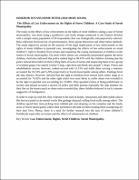| dc.description.abstract | ODIKHOR JOVANS HOME PETER (2010-MO83-1OO39)
The Effects of Law Enforcement on the Rights of Street Children: A Case Study of Soroti Municipality.
The study on the effects of law enforcement on the rights of street children, taking a case of Soroti municipality, was done using a qualitative case study design conducted in the Eastern division with a sample study population of 50 respondents that was strategically and purposively selected. Data collection involved use of questionnaires, focus group discussion and observation methods. The study objectives zeroed on the analysis of the legal implications of law enforcement on the rights of street children to parental care, investigating the effects of law enforcement on street children‟s right to freedom from torture and examining the coping mechanisms of children on the streets of Soroti municipality. On areas where abuses are commonly perpetrated against the street children, field data indicated that police ranked high at 68.42% with the children claiming that the police instead descended on them calling them all sorts of names and suspecting them to be a group of criminal gangs who snatch women‟s bags, rape them and break into people‟s shops. Prison and rehabilitation centres, however, ranked second with 13.15% and while those serving a sentence accounted for 10.53% and 5.26% respectively in Soroti municipality among others. Findings from the duty bearers, however, showed that the right to freedom from torture took centre stage as it accounted for 76.92% and the other right which was most likely to suffer abuse was revealed to be the right to parental care accounting for 23.08%. They quashed claims of being problematic in society and instead accused a section of police and their parents especially the step mothers for their fate on the streets much as observation revealed that, these children behaved in such a manner suggestive of hooliganism.
In order to cope up with life, they continue to be used in homes, restaurants and other public places like bus/taxi parks to do menial works like garbage disposal, selling food stuffs among others. The children spend their time picking from rubbish pits and sleeping on the verandas and the bushy areas of Soroti municipality where their tormentors descend on them sending them scampering for their dear lives. Hence, there is a need for further research into the area of street children‟s livelihoods especially on torture and the effects of urbanisation on children.
Key Words: Law Enforcement, Rights, Street Children, Soroti Municipality. | en_US |


